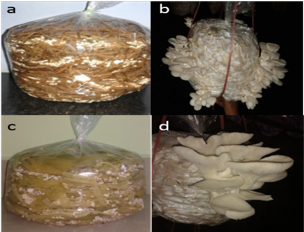Abstract
Mushroom is a variety of gilled fungi belongs to the class Basidiomycetes. It grows on tropical and northern temperate regions mainly in a moist condition. Mushroom act as a reservoir of nutrients. Edible mushroom plays a vital role in maintaining human health. The most commonly used edible mushroom is Pleurotus (oyster). It is rich in Protein, fibre, minerals and vitamins. It has a variety of fascinating properties like anti-inflammatory, anticancer, antiaging, analgesic and immune modulator property. The present study investigates the various phytochemicals and antibacterial potentials from the methanol, ethanol and aqueous extracts of fruit body mushroom. The cultivation of mushroom using different substrates such as paddy straw and corn straw. The mushroom extracts were subjected to qualitative phytochemical screening using standard methods. The crude extracts contain Alkaloids, Steroids, Flavonoids, Saponins, Phenols, Tannins, Proteins, Amino acids, Carbohydrates, Reducing sugar. The results indicated that the ethanolic extract had shown significant antibacterial activity against the test organisms. Enterococcal infection is a common infection prevailing nowadays. This study suggests that mushroom possess antibacterial potential against enterococcal species. So, intake of mushroom acts as a medicine for enterococcal infections.
Full text article
Authors

This work is licensed under a Creative Commons Attribution-NonCommercial-NoDerivatives 4.0 International License.

